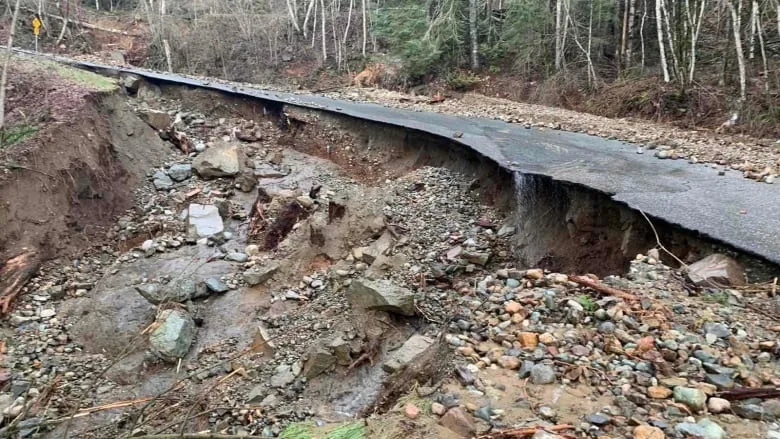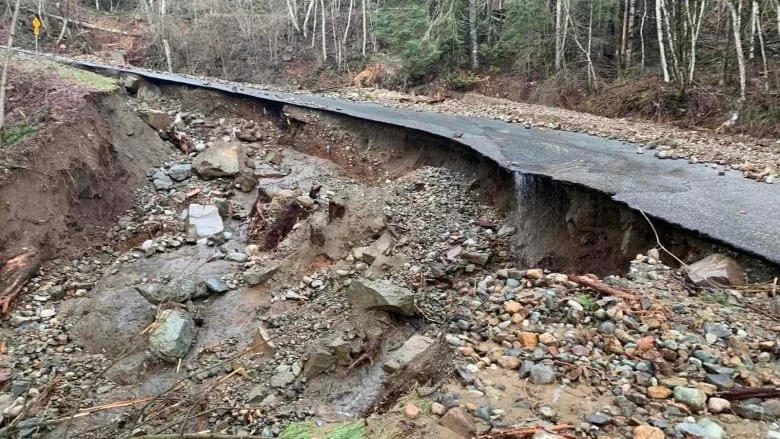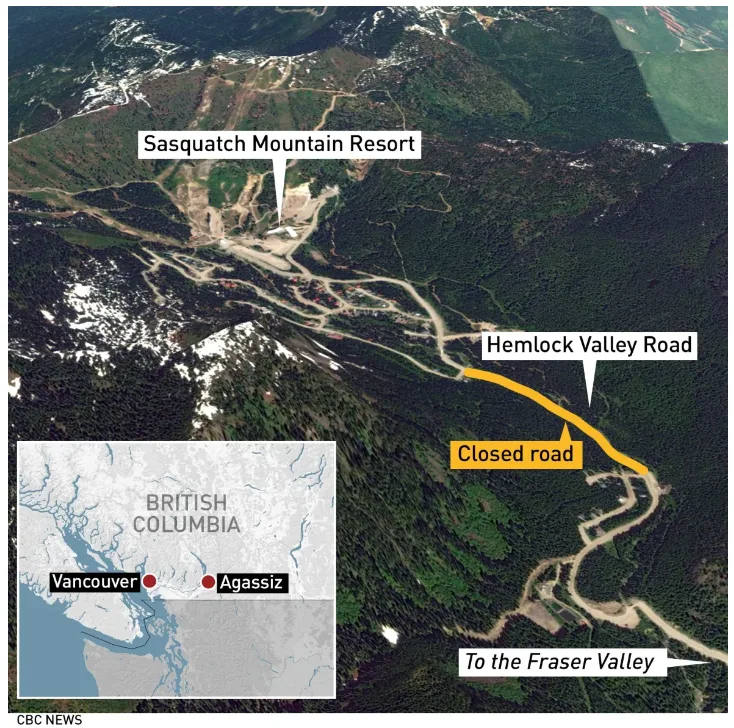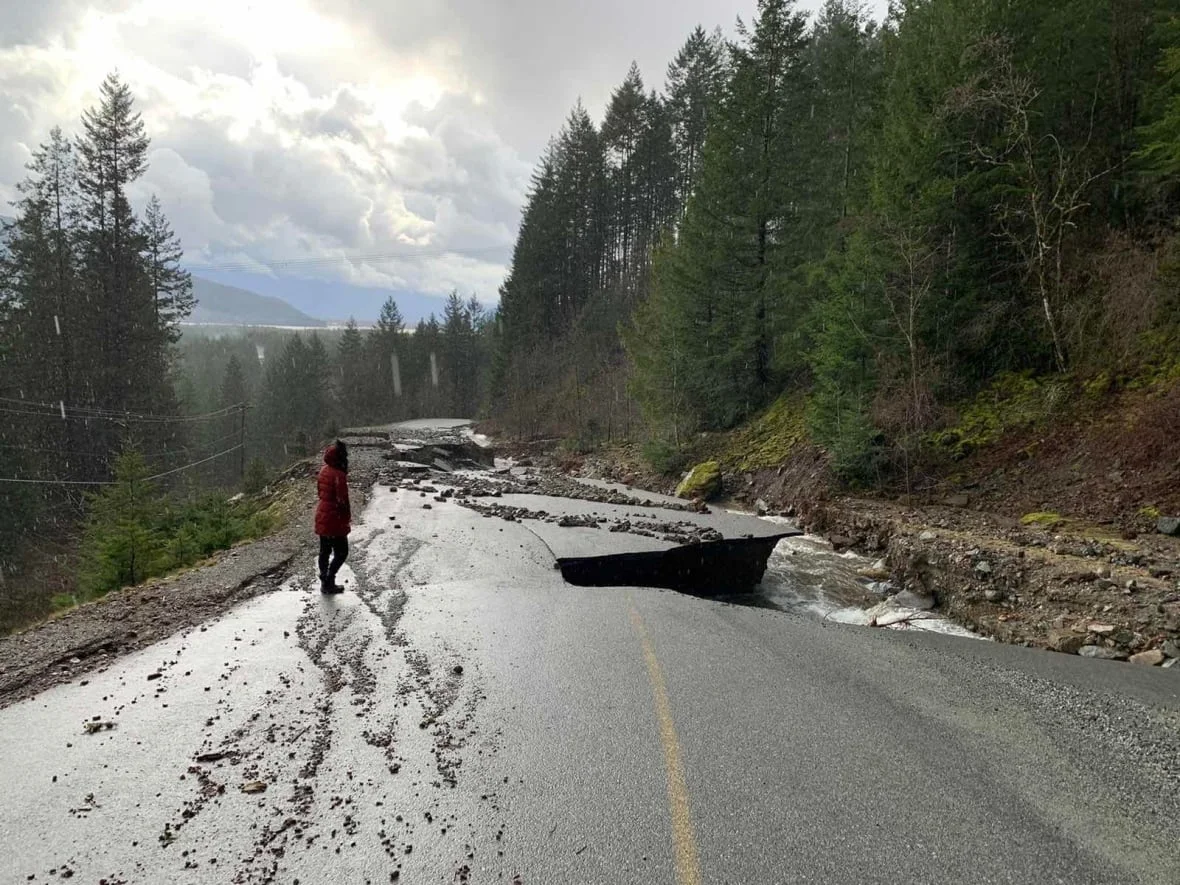
Hundreds stranded at BC resort may get road home on Monday
Hundreds of people heading into their third day stranded on a mountain in B.C.'s Fraser Valley could be taking a rough-and-ready, makeshift path home Monday afternoon after crews raced to clear grimy mudslide debris from the only access route in or out of the area.
More than 100 millimetres of torrential rain and muck took out a kilometre of Hemlock Valley Road below Sasquatch Mountain Resort area on Friday, trapping about 500 residents and visitors at the modest ski hill about 130 kilometres east of Vancouver.
About half of them paid for a helicopter ride off the mountain within two days. The rest hunkered down at rental condos and cabins, some without power, waiting for an update from provincial officials working around the clock.
On Monday, a statement from the B.C. Ministry of Transportation said officials hope to "briefly" open the road to one-way traffic so people can drive down from the resort, behind a pilot vehicle.

More than a kilometre of road was destroyed by a landslide near Sasquatch Mountain Resort on Jan. 31, 2020, leaving hundreds trapped without an access road home. (Submitted to CBC by Marketa Kapur)
"We are working closely with the resort to notify people on the mountain and to confirm timing, but anticipate this to begin at approximately noon today," the statement read.
Those at the resort were among hundreds more British Columbians stuck or endangered by the Friday rainstorm, which caused landslides and washouts across swaths of the province's South Coast.
"The last couple days have definitely been a bit of a challenge," said Shelby Lim, an employee with the Sasquatch resort.
The ministry said its teams worked non-stop to build a temporary, stable, one-lane road with limited access so people on the ski hill could leave.
"We've got to be very careful about how we make those emergency repairs to make sure it's a safe passage for travellers," Ed Miska, the ministry's executive director of engineering, said Monday.

Miska said the province's older road infrastructure is not designed to handle the extreme weather events that have become more frequent in recent years.
"Water is a powerful force of nature and although we plan for a certain amount of it, there are, at times, weather conditions — such as what we've experienced over the last couple of days — that can impact roads and related infrastructure," he said in an interview with CBC's The Early Edition on Monday.
"Newer roads that are designed will have the drainage systems to accommodate the changing climate. That being said, we have a tremendous legacy of infrastructure that was designed before climate change and it will take time for upgrades to happen."
The Friday slide left Hemlock Valley Road covered in sludge, rocks and strips of torn pavement hanging above gushing run-off around 9:30 p.m. PT. Most people stuck at the resort had travelled there earlier in the day with plans to stay the weekend, as a children's ski race was being held on the hill. Some, though, drove over the doomed road with an hour or so to spare.
"Water was just coming down all over the place. I kept wondering how the roads were still here. I kept wondering, 'This is not going to end well,'" said Michael Iwasaki, one of the resort guests, describing his drive up the mountain Friday.
"Then, yeah."

Heavy rains caused a mudslide to washout much of Hemlock Valley Road on Friday evening. Marketa Kapur, one resort guest, stood by the road on Saturday. (Submitted to CBC by Marketa Kapur )
More than 250 guests, including Iwasaki, paid a private helicopter company $150 each for a lift home on Sunday. Some of their children, largely unfazed by the disaster, gleefully took a co-pilot's seat and bounded onto the tarmac after landing at the Chilliwack Municipal Airport.
"I think next time there is a large storm warning, we're going to stay home. But it was a fun helicopter ride, first time for all of us," said Diana Chaytor, another guest who took a chopper down with her family.
Lim, the resort employee, said the hill was coincidentally well-prepared to host hundreds of people for the weekend because of the scheduled ski competition. Losing power in the storm was unexpected, but Lim said guests came together in the generator-fed lodge to charge phones, warm up and cook meals. Some who lucked out with wood-burning stoves in their units deliberately delayed a helicopter ride home to watch the Super Bowl on Sunday.
She acknowledged the steep cost of a flight home, but said it couldn't be avoided to cover the labour and gas for the private company.
Elsewhere on the South Coast, local states of emergency were declared in the Cowichan Valley on Vancouver Island and the District of Kent in the Fraser Valley. Both areas were overwhelmed by rain, which flooded or washed out major roads. Dozens of people had to evacuate their homes in the Harrison Hot Springs community.
The border crossing between Abbotsford, B.C., and Sumas, Wash., was also shut down after water swamped the U.S. town, leaving no route for drivers heading north or south.
The storm was a fitting end to one of the wettest Januarys on record for the southwestern corner of the province, with at least 28 out of 31 days marked by some form of precipitation.
This article was originally published on CBC.ca.